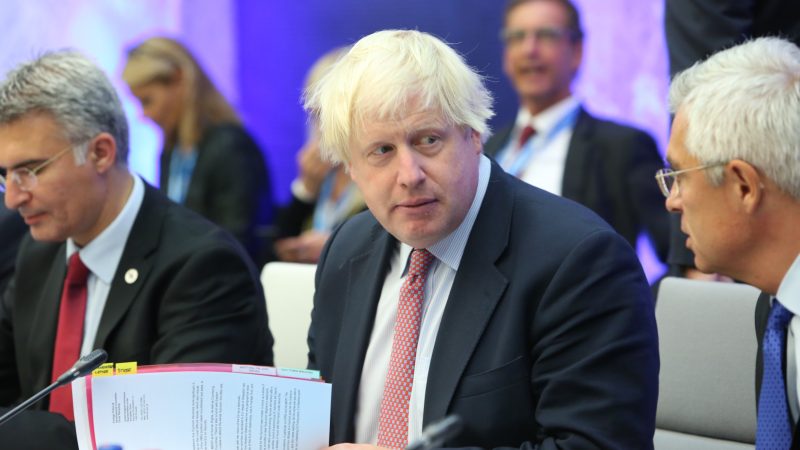The PM trumpeted the deal he struck over Brexit. In less than two years, his government is already attempting to unpick many parts of it, asserting its ‘unworkability.’

Boris Johnson’s “Mr U-Turn” nickname can certainly be applied to way Brexit is going. As today marks the sixth anniversary of the EU referendum, we look at the government’s major Brexit U-turns.
- NI protocol changes
One of the most high-profile and heavily criticised of post-Brexit U-turns are the changes put forward by the government on the Northern Ireland trade agreement, which kept the region inside the EU’s single market for goods.
On June 13, foreign secretary Liz Truss, tabled a bill in Parliament aimed at amending aspects of the NI protocol.
British food senior representatives have warned that the UK’s move to scrap part of the agreement with the EU would lead to a trade war, with the majority of the industry agreeing that the protocol is preferrable to a trade war.
Whilst Boris Johnson insists the changes proposed are ‘relatively trivial’, the EU firmly opposes the move, saying the unilateral action by Britain breaks international law and “is damaging to mutual trusts.”
2- Broken promises to reform farming post-Brexit
The government has broken its promise to reform farming post-Brexit,” writes the Wildlife Trust.
In its National Food Strategy published on June 13, 2022, the government’s commitment to provide a third of its farming budget for Landscape Recovery, was abandoned.
Prior to the publication of the new strategy, Defra said: “We will not have fixed allocations (or ‘pillars’, as they were known whilst we were in the EU) of money ring fenced to different schemes.”
According to the Wildlife Trust, instead of ring-fencing funds to reward landowners who want to take a more ambitious and large-scale approach to producing environmental and climate goods on their land, in practice, the government’s new strategy will mean the money will go towards meeting “only the most basic of environmental standards.”
The National Food Strategy has also been criticised for failing to address the threats to food security posed by biodiversity loss and climate change.
In response to the publishing of the new food strategy, Craig Bennett, chief executive of The Wildlife Trusts, said:
“The Government has broken the promise that it has made time and time again to restore nature across large areas as part of the post-Brexit agricultural transition – it’s a disgrace. Out-of-date farming policies have caused degraded soils, polluted rivers, and extreme loss of wildlife including the disappearance of insects and pollinators. Surely taxpayers’ money should be used to reward farmers to grow food in a way that is good for nature, rather than harming it – otherwise the food strategy will ultimately fail.”
3. Johnson’s comments comparing Brexit to the Ukraine war with Russia
The PM came under fire for comments at the Conservative Party spring forum when he appeared to compare the EU referendum result with Ukraine’s fight with Russia. Johnson said that it was the “instinct of the people of this country, like the people of Ukraine, to choose freedom”, with the Brexit vote a “famous recent example”.
Several days later, after being criticised for the comments, Johnson was accused of making a U-turn, saying he ‘totally agrees’ Brexit and Ukrainian war are not the same.
4. Britain scraps planned Brexit border checks
In what has been described as a ‘major U-turn’, in the April 2022, Jacob Rees-Mogg announced checks on imports to the UK, due to being enforced in July, were not happen as planned. Instead, the policy is being ‘reviewed’ before being introduced in a different form.
Rees-Mogg somewhat bizarrely admitted that the government’s Brexit checks would have cost traders £1bn a year and “would have been an act of self-harm.”
A new ‘Target Operating Model’ setting out the plans will not be published in the autumn. Gary McFarlane of the Chartered Institute of Environmental Health said: “We are deeply concerned about the ramifications of this decision.
5. Government accused of rowing back on promise to debate new post-Brexit trade deals in Parliament
Outraged lawmakers accused the prime minister of ‘rowing back’ on a key promise to debate the government’s new post-Brexit trade deals in parliament.
What became known as the ‘Grimstone rule’, was created by investment minister Gerry Grimstone’s calls for the government to “provide reassurance” to the House of Lords that parliamentarians will have a chance to debate all trade deals before they are ratified.
As Politico reports, the government told the Lords international agreements committee in response to its report on trade deal scrutiny that it “disagrees with the committee’s characterisation that the minister’s statement constitutes a rule.”
Dianne Hayter, chair of the committee, said British lawmakers are being treated like a rubber stamp without a proper chance to scrutinize trade pacts.
“If we can’t hold to what a minister says at the [House of Lords] despatch box, that’s quite serious for the whole of parliament,” said Hayter.
6. Johnson backs May’s Brexit deal after spending months criticising it
Let’s not forget that Boris Johnson’s Brexit U-turns began well before he was elected PM. Described as a ‘major U-turn,’ in March 2019, Johnson confirmed he would vote for Theresa May’s Brexit deal, despite spending months criticising it.
Having previously said May’s deal “wrapped a suicide vest around the British constitution – and handed the detonator to Michel Barnier,” Johnson confirmed his change of heart at a meeting of the European Research Group of Tory Brexiteers.
Gabrielle Pickard-Whitehead is a contributing editor to Left Foot Forward
Left Foot Forward doesn't have the backing of big business or billionaires. We rely on the kind and generous support of ordinary people like you.
You can support hard-hitting journalism that holds the right to account, provides a forum for debate among progressives, and covers the stories the rest of the media ignore. Donate today.



